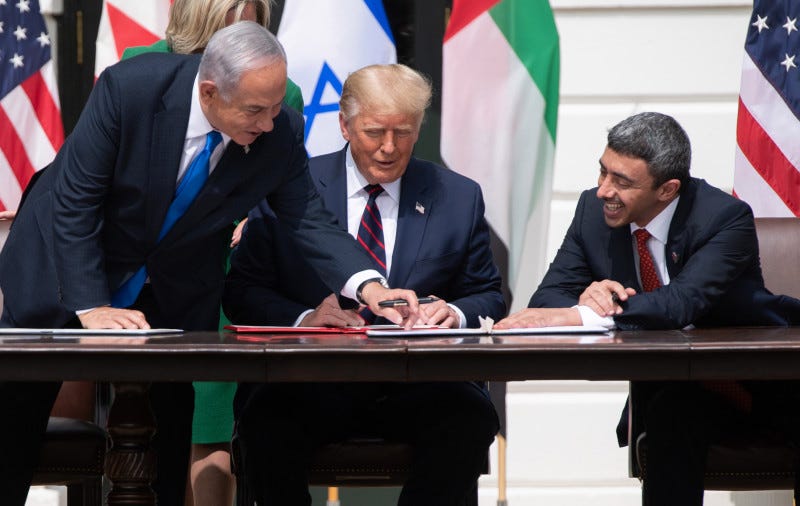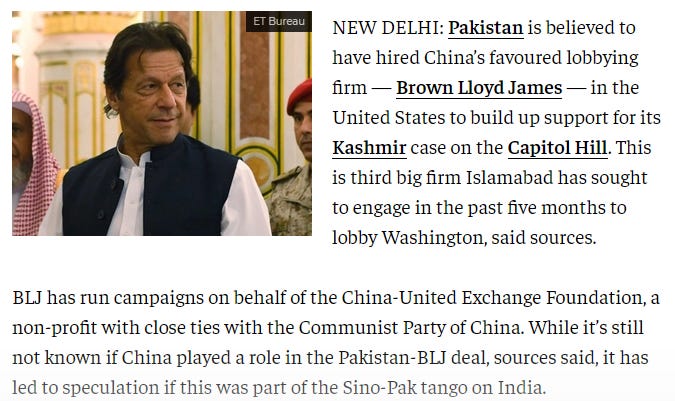Insightful newsletter of Drishtikone: Issue #242 - Rip Van Winkle
Rip van Winkle woke up to a new world that was fundamentally different. Biden may have too. In the years he was out, alignments have changed fundamentally. And India may be in an existential battle!
Image by Chräcker Heller from Pixabay
When the Soviet Union was brought down, it was done in an existential slide down between two different forces. They - the US and USSR - were in an existential battle. The only way to succeed was to dismantle the other and implode it. Unfortunately, the US did not handle the situation in Russia very well. But it did enough to make it much weaker to really pose a threat.
The new alignments that have happened over the last 4 years are unprecedented. The situations facing the new groups are very different. Whatever you may think of Trump or Biden, but a slew of executive orders cannot change the opening of an Israeli embassy in UAE and vice-versa. Given the existential hatred of 1400 years, it must have taken something truly fundamental to make this happen.
The fact is - that it has.
And, its ramifications have created a new world order. The world that Biden left when Obama’s reign came to an end and the one he has inherited are as different as Rip van Winkle woke up to.
Old ways will not work.
For India, it is an existential battle with Pakistan. The desperate one is ready to invest its all in a huge effort to take down just one man! That is how significant current times are.
On January 24, 2021, the UAE loan to Pakistan for $1 bn was to become due. Imran Khan had a discussion with His Highness Sheikh Mohamed bin Zayed Al Nahyan, Crown Prince of Abu Dhabi and Deputy Supreme Commander of the UAE Armed Forces in its backdrop. Apparently, UAE and also Saudi Arabia have decided to roll over the loan for another year.
The telephone call took place in the backdrop of reports that the UAE had rolled over its $1 billion loan for Pakistan for another year. The UAE had in 2019 provided $2bn to Pakistan to strengthen its foreign exchange reserves. The remaining loan of $1bn would mature in March and is also likely to be rolled over.
In December last year, when the Saudi soft loan was due for $1 billion, the Saudis had refused to budge and demanded it back. At that time, Pakistan had taken the money from China and handed it over to them.
Pakistan has returned $1 billion to Saudi Arabia as a second instalment of a $3 billion soft loan, as Islamabad reaches out to Beijing for a commercial loan to help it offset pressure to repay another $1 billion to Riyadh next month, officials said on Wednesday. (Source)
A commercial loan from China to return the principal of the soft loan from Saudi. Doesn’t look like a good deal at all.
As of January 15, 2021, Pakistan’s forex reserves with its Central Bank - State Bank of Pakistan, stood at $13,013.8 million (Source). If they had returned the $1 bn, the nation would have faced a severe balance of payments crisis.
Some of the Pakistani commentators are saying that the Saudis have done this because the Biden administration had sent a strong message to the Saudis by ending the aid to them in the war in Yemen. (Source)
Although it is interesting that the British government has not followed the US action and refused to follow suit.
British ministers have refused to join the US in suspending arms sales to Saudi Arabia for offensive use in war-torn Yemen, saying the UK makes its own decisions about selling weapons. (Source)
In January, Pakistan was putting its F-9 Park (Fatima Jinnah) public recreation park with 759 acres of green land on sale.
According to reports, due to financial issues the government has decided to mortgage the F-9 park of the federal capital to get a loan of about Rs500bn through issuing bonds. (Source)
Given the economic condition, there has been a push to privatize many entities within Pakistan.
The Pakistan Tehreek-e-Insaf (PTI) government is considering privatising 10 more entities including Zarai Taraqiati Bank Limited (ZTBL) and two gas utility companies amid slow progress on one and a half dozen enterprises that have already been picked for privatisation. The Utility Stores Corporation (USC) is also among the 10 entities that the Ministry of Privatisation has recently shortlisted for privatisation in the next phase, according to officials. (Source)
Many highways and even airports have been mortgaged in Pakistan to raise money.
The government had raised Rs 600 crore by mortgaging roads like M-1, M-4, IMDC and Okara Bypass, which yielded high toll tax. Subsequently, Hafizabad-Lahore highway, Faisalabad-Rawalpindi highway, Jinnah International Airport, Karachi was also mortgaged. (Source)
The Saudis are meanwhile pushing Pakistan to get closer to Israel, which it is moving forward with.
Given the fact that Imran Khan has messed up Pakistan’s relations with the Islamic world, Army Chief General Bajwa is now moving for the army to play a more active role in Saudi Arabia. Ayesha Siddiqa, a Pakistani journalist living in self-exile, has revealed that the army is taking over greater control of foreign policy by getting a senior military official, Lt Gen Bilal Akbar, appointed as its next envoy to Saudi Arabia. Siddiqa has also revealed that ever since his visit to Riyadh, General Bajwa has maintained his own ‘back channel’ with Crown Prince Salman. The principal role of Lt Gen Akbar would be to work with the Saudis to establish contacts with Israel and set the stage for Pakistan’s diplomatic ties with Israel — something the army appears keen to do. Pakistani and Israeli armed forces have worked together recently, when they were on the same side in the recent conflict in Armenia. The Pakistan army would now seek to use its moves for closer ties with Israel and to also alter its current friendly relations with Iran to restore a measure of trust with the Biden administration. Siddiqa notes: ‘After change in the US, the three stakeholders — Netanyahu, Mohammed bin Salman, and the Bajwa-led army — find themselves on the same page.’ (Source)
The Saudis had been pushing the Pakistanis to normalize relations with Israel. (Source)
So, from all apparent indicators, Pakistan’s economy is in a very precarious position. The only way it is surviving is by selling off its heirloom and offering itself for any favors that the powers may ask.
Biden’s administration and Democrats are predisposed to Iran in opposition to Israel. During Obama’s tenure, his administration had done a Nuclear deal with Iran that was quite favorable to the Iranians. As per one article in Washington Post, the Obama administration may have lied about the details of the deal.
President Barack Obama failed to disclose to Congress the existence of secret side deals on inspections when he transmitted the nuclear accord to Capitol Hill. (They were only uncovered by chance when then-Rep. Mike Pompeo (R-Kan.) and Sen. Tom Cotton (R-Ark.) learned about them during a meeting with International Atomic Energy Agency officials in Vienna.)
And, worse, Obama had allowed Iran to covertly circumvent the clauses for access to the US financial system.
Republicans on the Senate Permanent Subcommittee on Investigations, led by Sen. Rob Portman (R-Ohio), have revealed in a new report that the Obama administration secretly tried to help Iran use U.S. banks to convert $5.7 billion in Iranian assets, after promising Congress that Iran would not get access to the U.S. financial system — and then lied to Congress about what it had done.
During the Trump rule, the norms and the alignment in Middle East have fundamentally altered. In an unprecedented set of events, the UAE and the Saudis have now aligned with Israel like never before in history.
For the first time, the Arabs and the Israelis have worked out a set of breakthroughs that could never have been imagined.
As the Foreign policy journal suggested, Trump left a more stable and peaceful Middle East than he had inherited.
The indictments of U.S. foreign policy under President Donald Trump are as varied as his critics. The mandarins of the foreign-policy establishment have led the charge by insisting that the norm-shattering president has weakened U.S. alliances and empowered the country’s adversaries. Overlooked is the fact that the Trump administration has pursued a successful Middle East policy. And it succeeded precisely because it challenged entrenched assumptions. In the end, Trump will hand President-elect Joe Biden a region that is more stable than it was four years ago and an alliance network that is stronger than the one Trump inherited. This is a worthy legacy that will be squandered by the Democrats if they are determined to eviscerate all things Trump. (Source)
The gains from the Abraham accord were significant.
The agreement between Israel and the United Arab Emirates promises to establish normal relations between the two countries. These include business relations, tourism, direct flights, scientific cooperation, and, in time, full diplomatic ties at the ambassadorial level. The Emiratis are unlikely, however, to locate their embassy in Jerusalem. An important component of the Abraham Accord, though not specifically spelled out, is enhanced security cooperation against regional threats, especially from Iran and its proxies. It is important to note that Israel and the UAE reportedly already have security ties, but the agreement brings them into the open. (Source)
In January 2021, the Israeli embassy in Abu Dhabi was officially opened.
“The Israeli Embassy in Abu Dhabi was officially opened today with the arrival of the mission's representative, Eitan Na'eh,” the Israeli Foreign Ministry said in a statement (Source)
The UAE’s cabinet also approved the setting up of the embassy in Tel Aviv.
The United Arab Emirates cabinet on Sunday approved the establishment of an embassy in Tel Aviv in Israel, state media said, and Israel announced its embassy had opened in Abu Dhabi. (Source)
Many peace deals between the Arabs and Israelis have been signed with the participation of the US Presidents but most of them were to “stop the war.” This deal was not really a “peace deal,” but an accord for a closer alignment. It would be very surprising if any of the deals ever came close to such actions as the opening of consulates in each other’s countries.
The larger Arab world reaction was of welcome.
Within the region, Bahrain, Egypt, Jordan, and Oman publicly welcomed the Abraham Accord. Saudi Arabia has remained silent, though there is significant speculation among analysts that this nonreaction is a sign that Crown Prince Mohammed bin Salman supports the agreement but is constrained because his father, the king, opposes normalization with Israel. Iran, Qatar, and Turkey have all criticized the accord, with the latter threatening to withdraw its ambassador from Abu Dhabi. (Source)
That the world which Joe Biden left at the end of Obama’s presidency has changed fundamentally can be gauged from the reactions of the French President Macron on Biden’s promise to reinstate the Iran deal.
Not so easy, Joe.
Saudi Arabia and its ally the United Arab Emirates have said that Gulf Arab states should be involved in any talks this time which they say should also address Iran’s ballistic missile programme and its support for proxies around the Middle East. Macron stressed the need to avoid what he called the mistake of excluding other countries in the region when the 2015 deal was negotiated, according to Al Arabiya. (Source)
Macron wants the Saudis to be part of the new discussion with Iran on chalking out the new Iran deal.
If Saudis have to be part of the deal-making with Iran on their nuclear plans, then good luck with that!
A lot of water has flowed under this bridge and the world is no more interested in going back to the old structures that Biden left in 2016.
What do you see happening here?
In the last four years, the alignments in the geopolitical world have shaped like this.
If one looks at this picture, it is fairly easy to see where the future power is.
Let us take a step back and revisit an earlier discussion on how Pakistan is going after lobbying firms in the US. Read more details here - Issue #225 - Battle of Truthification
One loan after another is coming due and the only way to pay for the previous one is to take a more expensive one from ever depleting set of partners. Meanwhile, the national assets from airports to highways to even public parks are being either mortgaged or sold just to make ends meet.
And, this country is on a buying spree for lobbying?!!
Three expensive top lobbying firms in a few months.
Desperate people take extreme risks. In India, the greater the debt that a poor farmer faces, the more risks he takes to come out of that.
One who is facing an existential crisis will have a gambler’s mindset. Try to beat the desperate situation with “one good move that will yield jackpot.”
That is what Pakistan is doing.
market corner: 10 quick bytes
India to overtake EU as world's third-largest energy consumer by 2030: IEA - more
A radioactive device may be responsible for Uttarakhand glacier disaster, say villagers - more
Rhizen's cancer drug Umbralisib gets USFDA nod: Alembic Pharma - more
Govt asks automakers to stop selling vehicles with purposefully downgraded safety standards - more
Delhi govt prepares new excise policy that will increase liquor prices by 50% - more
Govt received Rs 36,709 cr dividend from 100 PSUs in 2018-19: CAG report - more
What is Koo, how to download it, and why Indian ministers are moving to the Twitter alternative - more
Govt to soon bring bill on cryptocurrencies - more
National Hydrogen Mission draft likely in the next two months: MNRE - more
MSME registration crosses 20-lakh mark on Modi govt’s Udyam portal; nearly doubles in three months - more
nota bene
Tatas to build fighters: In a first for the industry, the Tata Group will develop and manufacture a military aircraft in India, has acquired intellectual property rights for a German-origin platform. The plan, ET has reliably learned, is to integrate indigenous sensors and payloads to convert it into an intelligence-gathering asset. The high-altitude, twin-engine aircraft, capable of playing multiple roles from signal intelligence to cross-border surveillance, is currently in the final stages of testing in Germany. It is likely to arrive in India in the next three months for further integration. (Source).
A National Hydrogen Mission is in the works and a draft is expected in the next two months, the Ministry of New and Renewable Energy (MNRE) said on Tuesday. MNRE secretary Indu Shekhar Chaturvedi said that the mission will contain details about all aspects of hydrogen technology, including storage, R&D, and pilot projects. (Source)
Women Garuda commandos: Karnataka is gearing up for the first batch of all-women Garuda commandos of the state police. About 16 young women, mostly from villages across Karnataka, are now learning to shoot, handle terror, and improve their weapon-handling skills as part of the training. The special operations team Garuda, Karnataka’s own anti-terror force, was formed in 2010, and for the first time this year, the department will be training 50 women to join the force. (Source)
Killer Robots: Sex robots could be capable of killing unfortunate humans should they fall victim to malicious hackers, experts have warned. The anatomically correct humanoid creations feature increasingly sophisticated artificial intelligence (AI) with each new model, allowing users to enjoy a more naturalistic experience. However, this technology could be targeted by cybercriminals with violence in mind, according to a new article written by Hong Kong law firm ONC Lawyers for Lexology. It warns "unassuming sex robots are equally dangerous" as military AI when it comes to posing a threat to humanity's existence. (Source)
Penniless Roman Soldier: A payslip made from a sheet of papyrus shows a Roman soldier was left penniless 1,900 years ago after the military took out fees for certain items. The document was made out to a Gaius Messius, who participated in the Siege of Masada that was one of the last battles during the First Jewish-Roman War. The receipt shows Messius received 50 denarii as his stipend, but fees for barley money, food, and military equipment were taken out that totaled to the amount of his full pay. (Source)
video corner: The global big tech challenge
Most of the discussions in the media is very superficial and shallow. So, we have decided to start a series of dialogs with experts on topics that are important and need serious treatment.
As we have seen recently in the US, Big tech has great powers. Irrespective of our ideologies, we can agree that they can even superimpose their decisions on sovereigns today.
What are the challenges, ramifications, options, and alternatives in this new era? Here is a detailed discussion I had with Himank Barve, an IIT dropout and tech entrepreneur.
Today’s ONLINE PAPER: Check out today’s “The Drishtikone Daily” edition. - THE DRISHTIKONE DAILY
SUPPORT DRISHTIKONE: If you consider our work important and enriching and would like to contribute to our expenses, please click on the button below to go to the page to send in your contribution. You can select the currency (for example, INR or USD, etc) and the amount you would like to contribute. Contribute to Drishtikone
If you like this post - please share it with someone who will appreciate the information shared in this edition
If you like our newsletter, please share it with your friends and family








